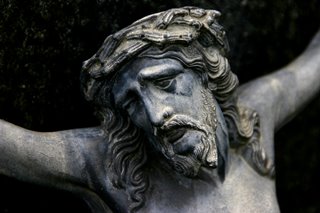 One of the most popular quotes by Christians about Jesus on the Cross is a quote by Jesus on the Cross. In Matthew 27:46 it says, “About the ninth hour Jesus cried out with a loud voice, saying, “Eli, Eli, lama sabachthani?” that is, “My God, My God, why have You forsaken Me?”
One of the most popular quotes by Christians about Jesus on the Cross is a quote by Jesus on the Cross. In Matthew 27:46 it says, “About the ninth hour Jesus cried out with a loud voice, saying, “Eli, Eli, lama sabachthani?” that is, “My God, My God, why have You forsaken Me?”
I want to begin a discussion today on the general way Christians treat Jesus’ quote, and the specific doctrinal fodder that this treatment provides modern, culturally distant believers.
Many have taken this text as THE proof for the doctrine one might label—The Divine Rejection of Christ on the Cross.
The Idea is that when Jesus “took our sins upon him” on the cross, God’s wrath was poured out against that sin… The father turned his back on the son, rejecting him for that time that he bore the sin. Jesus it is said, “became sin,” so the Father couldn’t look upon Him as sin. It is proof positive that our forensic vision of the hows of Christ’s atonement are spot on… this is exactly how and why it works for us. Jesus took them on, became them, the Father then hits Jesus with every ounce of eternal wrath He can muster and Jesus, being eternal himself is able to absorb the blow as the sin burns up and he, eventually, returns to the land of the living… it’s hard to keep a Godman down.
The quote is taken as Jesus’ actual feelings of abandonment, a one for one expression of His sorrow over being “unseen” “forsaken.”
Thus we find this quote from “Got Questions”: “He was made a sin-offering, and He died in our place, on our account, that He might bring us near to God. It was this, doubtless, which caused His intense sufferings. It was the manifestation of God’s hatred of sin, in some way which He has not explained, that Jesus experienced in that terrible hour. It was suffering endured by Him that was due to us, and suffering by which, and by which alone, we can be saved from eternal death. In those awful moments, Jesus was expressing His feelings of abandonment as God placed the sins of the world on Him – and because of that had to “turn away” from Jesus. As Jesus was feeling that weight of sin, He was experiencing separation from God for the only time in all of eternity. … He felt the loneliness and abandonment that sin always produces, except that in His case, it was not His sin – it was ours.”[1]
But is it so?
Not the atonement part, but the abandonment part… and the forensic picture that emerges from our interpretation of the abandonment part.
Today, I’d like to establish two basic truths which I will use meaningfully in near future posts to address questions concerning Jesus’ use of Psalm 22.
First truth: We need to distinguish the event—On the Cross Jesus says, “Eli, Eli, lema sabachthani?”—from the interpretation of the event—Jesus said this because (fill in the blank).
Things are not always what they seem… especially when viewed cross-culturally.
Our Christian desire to answer questions about atonement often overwhelms both Matthew 27:46 and Psalm 22:1. We tend to use two other texts (also interpreted in light of our modern sense of things) as interpretive lenses.
First, we have 2 Corinthians 5:21, “For our sake he made him to be sin who knew no sin, so that in him we might become the righteousness of God,”
Then we have Galatians 3:13, “Christ redeemed us from the curse of the law by becoming a curse for us—for it is written, ‘Cursed is everyone who is hanged on a tree.’”
It is we who make these connections based on our own sense of justice. We feel a powerful need to make sense of the cross event in terms that one from our worldview would mentally embrace as justice. Just so, Mann writes, “Some reformers with a feudal view of reward and punishment… taught that Jesus was forsaken by God because Jesus was a substitute for sinners and therefore an object of wrath.”
Second, the most important thing to remember about Jesus’ “forsaken” statement on the Cross is that Jesus was quoting Scripture!
To quote something is NOT the same thing as saying something. It is far less direct, far more nuanced, and as you shall see, in the end, less opaque.
The question is not merely, “What did Jesus mean when he said “Eli, Eli, lema sabachthani?”
The question is “Why did Jesus quote Psalm 22:1 at that moment?”
The two questions emerge from two different orientations to the text. It is hard to get the right answers if one is not asking the right questions.
So, why did Jesus quote Psalm 22:1 as he was dying on the cross?
I’m glad you asked. Stay tuned.
[1] http://www.gotquestions.org/forsaken-me.html#ixzz320N9jLB3 (11/18/2014)




